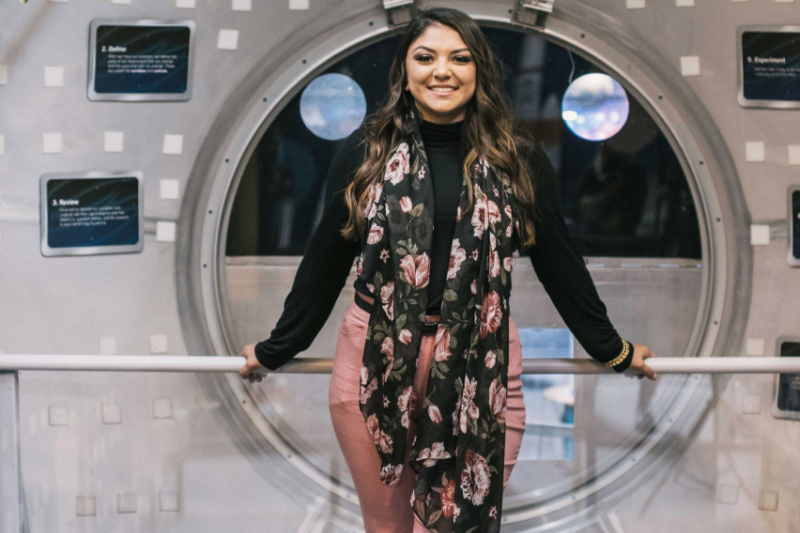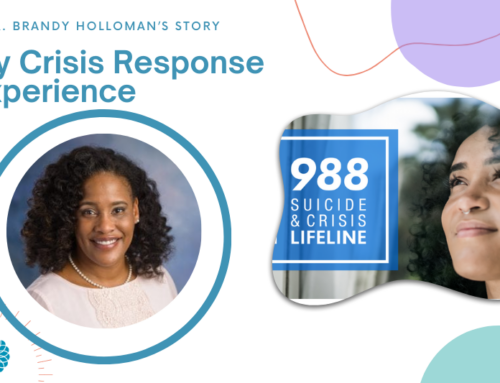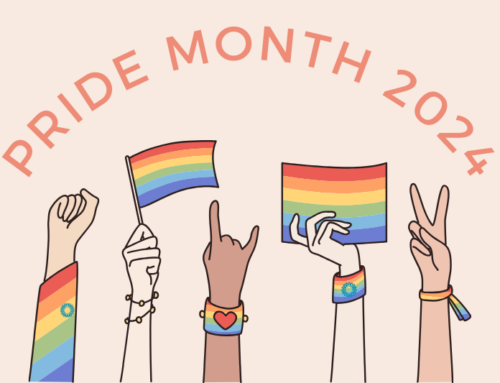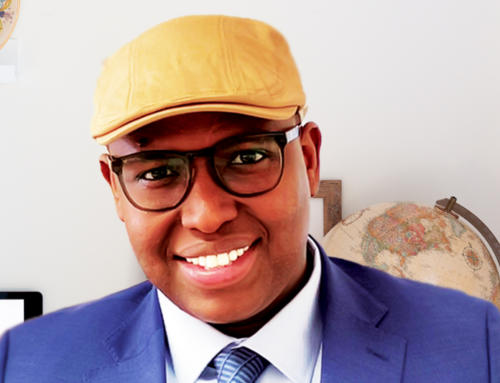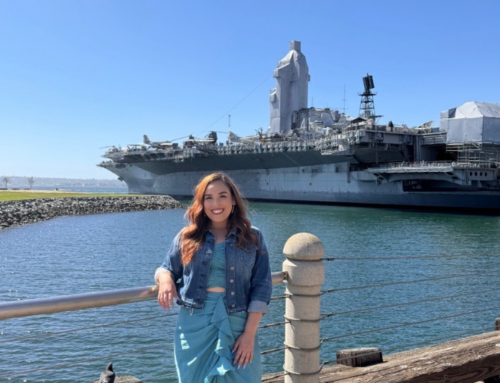About the Series:
Change Matrix has launched a new Podcast Series for 2021, called Equity in Action. Since our inception in 2008, founders Elizabeth Waetzig, Rachele Espiritu, and Suganya Sockalingam have maintained a focus on cultural competence and eliminating disparities. We continue a focus on equity on all of our current projects, continuously look for ways to take action, and look forward to a world where all people get what they need, in ways that work for them, in their communities.
What we Discuss in this Episode:
Growing up in Southeast Colorado Springs, Julie Ramirez was not taught about equity explicitly, but she did become keenly aware of inequities. Perhaps most notably during her time at school. She recalled visiting other, newer schools for sporting events with worn-out gear, the attitudes of certain parents and teachers about her school district, and more. It was because of these inequities that she helped create Daily Dose 719, a daily dose of culture and community around Southeast Colorado Springs: stompingroundz719.com/dailydose.
Listen as Change Matrix’s own Annie Guo VanDan talks with Julie about how her past experiences helped shape the Daily Dose project and other activism work she’s done to build a more equitable Colorado Springs.
Transcript of the Conversation:
Annie VanDan:
You’re listening to the Equity in Action Podcast brought to you by Change Matrix. We are sharing the stories of people connected to our organization who have made positive change in equity with the goal of inspiring you to take action.
I am Annie Guo VanDan with Change Matrix and today I am joined by Julie Ramirez, producer of Daily Dose 719 and a community activist in Southeast Colorado Springs, who I’ve had the pleasure of working with through the Colorado Equity Compass Project. Julie, welcome. I know you are doing so much work around equity and addressing racial and social disparities in the Southeast Colorado Springs community. Could you start by sharing more about Daily Dose 719 and how you are making connections with your community to help share their stories?
Julie Ramirez:
Yeah, so Daily Dose 719 was a concept that I had in my mind for years, really. I knew there was like this narrative about my community where everybody thought of us as the bad side of town, that’s not decided town you wanted to go to, you don’t want to send your kids to those schools. And, and I realized there was just so much going on within our community that we needed to have a platform that shared these stories. And the opportunity finally presented itself through working with the Colorado Equity Compass. And we were able to get some funding and actually put together these videos.
And so, it’s a six-part docuseries highlighting the people in Southeast Colorado Springs but also trying to help explain what health equity is and how all of these different things are impacting our community. And so, it’s just bringing all of those things together to tell the story of our community, but also to be a platform for people to tune in and learn about the community and take advantage of the different opportunities that are here in Southeast Colorado Springs, because, over the last few years, there was a lot.
Annie VanDan:
Sure. Yes, I’ve really enjoyed watching the videos and being in Denver, feeling really connected to the work that you’re doing and feeling like there’s so much we can be doing to partner and learn from each other. So when in your early life, did you first learn about equity?
Julie Ramirez:
So, I don’t feel like I actually knew what equity was, but I definitely was familiar with inequities. I remember — so, Harrison School District 2 serves Southeast Colorado Springs and it’s one of the most diverse school districts in the city and we also had less access to resources. And so, everything from just being on a sports team and seeing how we have jerseys from who knows how many years ago and we’re going to [compete at] a school that has brand-new jerseys, matching shoes, and a crowd full of fans. And so, it was really through participating in sports and traveling to the different schools in the different cities and seeing how different it was.
And so, I didn’t realize it was like this whole issue until I was really out of Colorado Springs for a little while and, and looking back and thinking, “Well, okay, that’s not normal for us to want to experience the different things that we were.” Like, just going through school, that’s where you experienced racism and that’s where you experienced, like, seeing yourself as less than because of what the area looks like or what the school provided, or even like how teachers would even speak about the school district or things like that.
And so, I didn’t realize it and when I was in it, but afterwards, looking back, it’s like, “Okay. Yeah, there were definitely inequities happening.”
Annie VanDan:
Sure. Yes. And I do think a lot of times our understanding of it is seeing the disparities and, from what I’ve seen, there’s been a more recent shift to focus on the positive and addressing, advancing equity. But even in Colorado at the state health department, where I used to work, the office used to be called the Office of Health Disparities. And in recent years switched to Office of Health Equity and that shift. But I think like you said, for many of us, we see it because we see the disparities and inequities and feel like something needs to be done.
So I know you’ve lived in the Southeast Colorado Springs community since you were 3 years old and you just shared some examples of things you’ve seen, but what other types of inequities have affected the community that helped you design the episode topics for Daily Dose, such as neighborhood housing, education, criminal justice?
Julie Ramirez:
Yeah. So a part of the challenges here in Southeast is that I feel like economically we were left behind. And so our most recent episode was on economics and the types of things that they’re doing today t to kind of address the lack of economic development in Southeast. When you think about Colorado Springs, like, this city is booming and it really has changed in the last five years. But what I like to say is, “Southeast as a flashback to the ‘80s,” because they built it and then they forgot about it. And the buildings are just — it doesn’t paint a good picture in people’s minds, especially seeing the rest of the city. And so, it’s a combination of — it’s the economic development, because that brings the jobs and opportunities and the ability to provide for your own family or build wealth.
And, and then the other side of that is you usually don’t get to that point of building wealth or access to well-paying jobs without a good education. And for a long time Harrison School District 2 was really struggling on getting kids to graduate and/or stay in school. And so those are a lot of the challenges that we’re facing — I think some of the biggest ones. I think housing is kind of a given, everybody’s really struggling with housing across this whole state right now. But yeah, those are the few topics we’ve hit on. And then also like social connection, being able to talk to people, confiding people have a support system, and all of that is so vital for people to thrive. And it all comes down to stress really, but it’s a lot of different things, unfortunately. So it’s got to be this, like, multi-faceted approach to addressing all of this. And yeah, it’s been … it’s been a challenge.
Annie VanDan:
Sure. Could you share a little bit more about some of the efforts you’ve been a part of to address these challenges and try to improve on like the fairness and justice issues, including some of your work with RISE and like the very important people of the community?
Julie Ramirez:
Yeah. So the project that I’m most proud of in Colorado Springs is the transforming safety initiative. And so, that was redirecting money from the Department of Corrections and putting it into community as an effort to prevent crime from happening. And so, I joined the local planning team, which was a part of like the initial phase where we had to decide what are the boundaries of Southeast and what were our community’s crime prevention priorities? And so, in joining that group, I met everybody that was already doing so much work within our community. And then I even allowed to be a part of the grant-review committee. And so, I was able to have a say in how $1.3 million will get spent in my own community. And so, that was a huge, huge thing for me to be a part of it.
And then, I ended up getting a job that was funded by transforming safety. And so, it just like made full circle. And I was leading the Grow Your Own Community advocate training, where I was able to train 50 residents of Southeast Colorado Springs, giving them tools, knowledge, connections, to better advocate for our community. And yeah, that was a lot of those people that went through the training, they’re a part of different organizations now. And I think it’s really helped move the work forward. Transforming safety brought a level of collaboration that I don’t think Southeast Colorado Springs has seen before. And so — and through all of that, I met Joyce Salazar, who is the community outreach coordinator of RISE Southeast, whose mission is to enhance Southeast from within through resident-led change. And so, we’ve done everything from events in the park to getting proclamations at city council.
And so, that one has really opened a lot of doors in how we can address equity and the disparities of Southeast Colorado Springs. And one in particular is the Panorama Park Project. RISE has been the community engagement element of that whole project, and we’ve been able to do a ton of events, tons of surveys, tons of opportunities for people to tell us what they want to see in the park. And now we have a $9 million park renovation coming to our community. And so, I’m really excited about that because that park, it’s 13 acres and you would go there just to basically see broken bottles and really nothing you can do at that park. And now, it’s just going to be this amazing place. I’m really excited about that.
Annie VanDan:
That’s so wonderful, and for you to share how residents are involved and getting resident feedback. Are you feeling that you can start seeing some of these changes and empowered as a community resident to make a difference?
Julie Ramirez:
Oh, definitely. The way that the Panorama Park process went, I think should give a lot of people hope that we do have a say. And I do think that it’s created more civic engagement for community because we were taking people to the park’s board meetings, and public meetings with the city, and all of those types of things. And it’s getting them to rally around something that they cared about. And so, I think it exposed a lot of people to something that they weren’t really familiar with before.
Annie VanDan:
So good. I have loved working with you on the Colorado Equity Compass, and I was curious how you engage the community residents. How have you identified them to share their stories? Have they been excited to be involved with the project and excited about having the platform to share?
Julie Ramirez:
Yeah, I think a lot of what I learned and wanted to put forward for Daily Dose was pretty much what I was doing with the advocate training. Each advocate training session was economics or civic engagement. And so, it kind of — it was just a natural transition to doing these video series. And so, a lot of the leaders that are a part of it I’ve met through advocate training through RISE, and I just know that they had something that the community needed to hear and learn about. And then in Southeast Colorado Springs, everybody knows everybody. My mom went to high school with the people that I’m friends with now, and now our kids are growing up together. And so, it’s really easy to find people that can help tell the stories that we’re touching on.
And so, it’s been really cool to learn new stories from people. And it seems like I put out a call the other day for people that graduated from Harrison School District 2 and are teaching in School District 2. And I’m getting all these emails now of people sharing their pictures to be included in Daily Dose. So we’re not quite to that level of like engagement that I would like, but it’s there. And I’m excited for when it’s just natural. Everybody knows, “Oh, Daily Dose. Yeah. I know all about that.”
Annie VanDan:
Yes. That’s awesome. You’re doing such great work with it, and I’ve definitely seen it shared in a lot of different spaces. I’m curious. What would success, in terms of equity, look like in your community? So, what do you wish was happening in terms of improving equity? And, in other words, what isn’t currently happening that you think needs to change? Would success look like more people staying in the community? You mentioned leaving and then coming back and really wanting to help your community. Would that be success that the residents feel like this is a place they want to stay and grow their families?
Julie Ramirez:
I guess it’s more of them having the choice to be able to stay or leave. I think a lot of people end up staying here because it is the area of town with the most affordable housing. And it’s really not an option to live anywhere else in the city. A lot of people that I know are moving south to Fountain or East to Falcon, Peyton. And so, I guess it’s a combination of just people being able — it’s health equity — people being able to attain their highest potential of health. And so, there is a lot of initiatives that are still in like planning phases or like not quite being executed. And so, I’m just I’m eager for those to just like come to fruition. So, for example, there’s a community investment trusts in the works.
And that’s an opportunity, one, for residents to be able to learn about financial literacy and then, two, being able to invest in a commercial piece of property within our own community. And so, stuff like that is going to be extremely empowering for people that do want to invest in their own community and want to see it change and evolve into something better so that they can say if they want to say. Or, if they want to leave, they can. And so, just being able to see some of these projects move a little faster, that’d be great (laughs).
Annie VanDan:
Sure. I have one last question. We know that these days with so many tragic events happening across the country, it can feel very difficult to make a difference. What advice do you have for others who want to act, who want to do something about the inequities in their community, address systemic racism, improve health disparities, but they don’t know where to start? What would you tell them?
Julie Ramirez:
So, I guess before I dive into that, a little, I heard this term, people fighting for health equity are JEDIs. JEDI standing for Justice, Equity, Diversity, Inclusion. And I was just like really hyped about that. I was like, you’re right. You know, and then like in “Star Wars,” the Jedis, they’re trying to guard peace and justice. And so, I thought that was really cool. And I hope there’s more people interested in getting involved in this work. And here in Colorado Springs, we have the transforming safety organizations that are currently getting funded. Earlier this year, or in 2020, they cut the funds for that program by $1 million dollars. And it’s also a sunset program, so we really have to be able to show that these programs are effective in preventing crime. And so, it’s just, if people could get involved with those organizations and help advocate for that type of programming, I think that’s what we’re talking about when we’re saying, like, “defund the police,” we’re talking about redirecting funds into the real resources and opportunities that people need.
And then I think there’s a few different levels of what people need to think about when addressing equity. It’s individual self, like, how can you as an individual make sure you’re calling out inequities? Or, even as an organization, I know there’s a lot of boards here in Colorado Springs that they’re not diverse but they’re trying to still serve these diverse populations. And so, I think those — I challenged those people to like, okay, if your board is not reflecting the people you serve, it might need to be an extreme where you let go of the whole board. Like, who knows? It could be something like that. And so, I think just really recognizing what this work means. If an organization needs to have an equity training, there’s a lot of those going on these days. And so, taking advantage of those types of resources, and being part of the solution.
Annie VanDan:
Sure. And I will just have one more question. We know that this work is hard and it can be tiring and there’re days where it just feels heavy. And all of the things we keep seeing in the news — what do you do to keep motivated and know that it’s worth fighting for?
Julie Ramirez:
I think Daily Dose is really rewarding because I get to hear the stories of the people. And a lot of those stories are of people being resilient. And despite the inequities that they’ve been faced with, they come above it and they are able to make a life for themselves and their families and break generational curses. And so, I love to hear those types of stories, but, also, just, you’ve got to be really intentional with your time. That’s the challenging part is you got to take that time for yourself to check out and take care of yourself. And, for me, that looks like journaling and getting out to the mountains and, and all of that. But, at the end of the day, like, hearing the stories of the people are what fuel me and keep me going.
Annie VanDan:
So, Julie, if any of our listeners are interested in watching the Daily Dose and getting connected, how can they do that?
Julie Ramirez:
So, on all social media platforms, you can find us at Daily 719, or you can visit the website, https://www.stompingroundz719.com/dailydose.
Annie VanDan:
Okay, well, thank you so much for joining us today, Julie. We appreciate your time and sharing with us your experiences working directly to address inequities in the community you grew up in. Southeast Colorado Springs is very lucky to have you, so is the Colorado Equity Compass.
Julie Ramirez:
Thank you. Thank you for having me. This was a great opportunity, and I hope it inspires somebody to jump into action in their community. Thank you.
